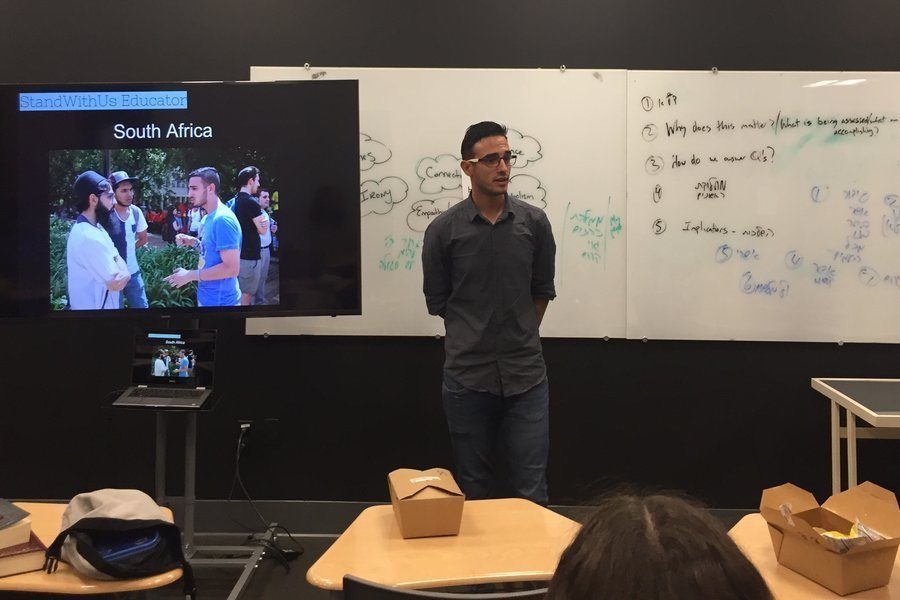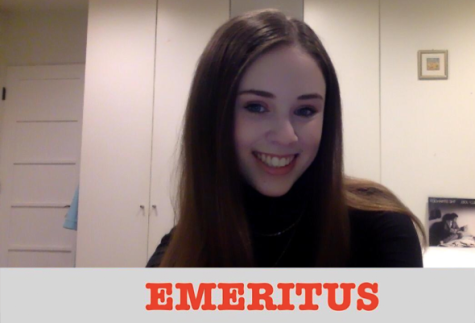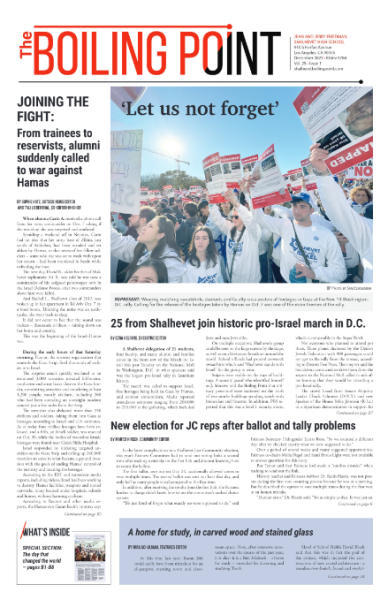The gradual Zionist: Yahya Mahamid of Stand With Us tells lunchtime audience how he became pro-Israel
January 26, 2018
The Jewish people have a right to have a country in their homeland, according to a well-known Arab Zionist who spoke during lunch Dec. 6.
Yahya Mahamid, a 19-year old non-Jewish Israeli activist, joined Shalhevet students during a Firehawks for Israel meeting in the theatre and spoke to about 20 9th-, 11th- and 12th-graders. He works with the Stand With Us organization, which promotes Israel education throughout the world, including among Arabs.
“I don’t want every Arab to think exactly like me,” Yahya said to a quiet room of focused and intrigued students.“I just want to plant a seed.”
Yahya proudly identifies as a Zionist — that is, one who believes the Jewish people should have a home in its ancestral land. He welcomed President Trump’s decision on Dec. 5, to move the U.S. Embassy from Tel Aviv to Jerusalem, and plans to join the Israeli Defense Forces in March.
Ms. Natalie Weiss, faculty adviser of Firehawks for Israel, arranged the event after finding out about Yahya from Ms. Mina Rush, a friend of hers who is Stand With Us’s Director of Community Engagement.
Born in Umm el-Fahm — the third-largest Arab city in Israel — Yahya said he grew up in a town where people were known to support terrorist organizations. Further, he was taught as a child to hate Israel and to understand that all Israeli Arabs were victims.
However, when he was in high school, because of the underdevelopment of his city, job opportunities were hard to find. He ended up finding a job in Tel Aviv — where he was nervous, he said, because based on what he had been told, he thought he would be treated as inferior.
When he arrived, he met his Jewish coworkers and it was a success; he started communicating with Jews more and decided that it wasn’t so black-and-white, and that maybe many of the things he had been told growing up weren’t true.
Everything was going great until June of 2014, he said, when he heard about the kidnapping of Naftali Frenkel, Gilad Shaer, Eyal Yifrah, three Israeli teens kidnapped by Hamas while waiting at an intersection trying to get a ride toward Beit Shemesh. Eventually, their bodies were found in the West Bank almost three weeks after they went missing.
Yahya thought the kidnapping was wrong, and in solidarity sent a photo of himself with an Israeli flag to the “Bring Back our Boys” campaign.
He soon realized that this picture was being circulated through Israeli and also Arab news media, and he received many hateful comments from people in his own community. He found he couldn’t walk through the streets of his town, and was warned he might be attacked or worse. Many people were talking badly of him, he said.
When news of his situation became known, he was contacted by Stand With Us and began becoming involved.
Stand With Us, he said in his Shalhevet talk, “elevated Israel around the world.’
After volunteering for a year, he became a Stand With Us Educator himself, and began to give speeches on behalf of Israel in various places around the world. He described a trip to South Africa, where he traveled to promote Israel activism on the campus of WITS University in Johannesburg.
Yahya said that throughout the week, members of the BDS movement — which advocates boycott, divestment and sanctions against Israeli companies — would verbally taunt and harass the Stand With Us group. But on the last day of the week, the BDS members did not appear.
According to Yahya, this showed they had given up, and that Stand With Us angered them by telling the truth.
Yahya also showed the Shalhevet group a video in which, in Arabic, he condemned terrorists who killed two Israeli police officers in a shooting on the Temple Mount July 14. The video took him five hours to film, he said, and reached half a million people in three days.
When the video ended, all of the Shalhevet students clapped loudly.
Those who attended said they were encouraged by his talk.
“Sometimes you hear so much bad news about anti-semitism and it was nice to finally hear about a non-Jew that’s Zionist,” said freshman Shani Menna.“It’s really special and gives me hope for a brighter tomorrow that people like him exist.”
When people who ask him why he does it – promotes Israel like this – he responds that he believes in democracy, freedom, and human rights, he said.
He quoted his mother, who he said told him: “He who is silent about what’s right is a speechless devil.”














